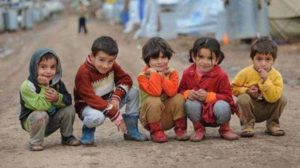Government urged to act on global refugee crisis
The Federal Government on Tuesday received a blueprint on how Australia should best respond to the global refugee crisis, as “shocking” new figures reveal 20 people are displaced every minute.
Organised by Oxfam, the Right to Refuge petition, which has gained the support of more than 42,000 people, is calling on the government to increase Australia’s refugee intake to 30,000 by 2018-19 and 42,000 by 2020-21.
It is also calling for increased aid to countries hosting large populations of refugees and for the government to treat all people seeking refuge in Australia with dignity and respect, and uphold Australia’s obligations under the Refugee Convention.
 Oxfam Australia humanitarian policy advisor Nicole Bieske said a resettlement program did not replace Australia’s obligation to provide protection to people who apply for asylum in Australia.
Oxfam Australia humanitarian policy advisor Nicole Bieske said a resettlement program did not replace Australia’s obligation to provide protection to people who apply for asylum in Australia.
“(We have) continuously called for the processing centres on Manus Island Nauru to be closed and for people found to be refugees to be brought to Australia,” Ms Bieske said.
She said in order to respond to the global refugee crisis wealthy countries around the world needed to “step up”.
“We call on governments around the world to step up and offer more support – for wealthy countries to increase the number of refugees that they resettle and the aid that they give to poorer refugee hosting nations, and for countries hosting large populations of displaced people to create environments where people can live in safety, contribute and thrive,” Ms Bieske said.
The petition came a day after the publication of UNHCR’s annual report, released Monday, which revealed the number of refugees and displaced people has increased by about 300,000 to 65.6 million.
According to the UNHCR Global Trends survey, the Syrian conflict has displaced 12 million people overall. This equates to 65 per cent of the country’s entire population who have either been displaced internally or have fled to other countries.
The report also said that South Sudan saw the fastest-growing population displacement in 2016, with 3.3 million people fleeing their homes.
It revealed the 20 people are newly displaced every minute of the day.
“Developing regions hosted 84 per cent of the world’s refugees under UNHCR’s mandate, with about 14.5 million people,” the report said.
Highlighting the disproportionate burden carried by poorer nations, the report said developing countries “hosted 84 per cent of the world’s refugees under UNHCR’s mandate, with about 14.5 million people. “The least developed countries provided asylum to a growing proportion, with 28 per cent of the global total.”
Ms Bieske said the scale of the global refugee crisis is “shocking” and the figures proved that more than ever people need support.
“This massive number of displaced people – the worst since the UN started keeping its numbers – is made up of individual people who are caught in unthinkable circumstances and who have been forced to make the impossible decision to leave their homes behind to seek safety for themselves and their loved ones,” she said.
“These new numbers underscore that the global community must immediately offer stronger lifelines to these vulnerable people as they flee for their lives, and also work together to tackle the root cause of the problem.”
Ms Bieske said “cynical politics” were at play in denying vulnerable men, women and children’s rights to refuge.
“Over the next year the world will negotiate a new UN deal on refugees and migrants and to succeed, it must commit nations to share equal responsibility for the protection of all those forced from home,” she said.
Cesira Colleluori












